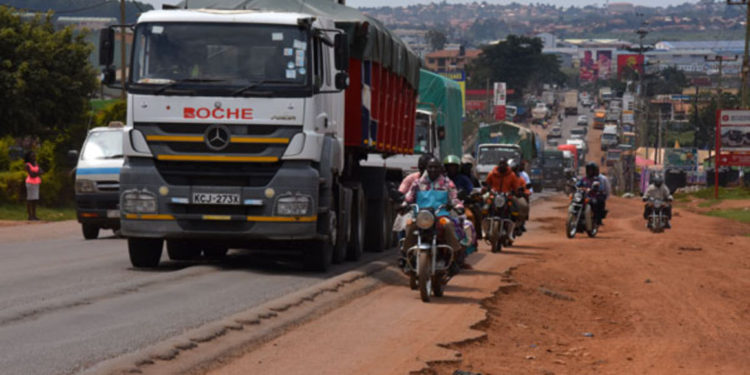Uganda’s $1.2 billion Kampala-Jinja expressway project, once touted as a transformative infrastructure initiative, has devolved into a cesspool of bureaucratic bungling, political meddling, and donor frustration. What was envisioned as a beacon of progress now stands as a monumental testament to administrative incompetence and corruption.
Conceived as a Public-Private Partnership (PPP) to address Uganda’s infrastructural deficiencies, the expressway was supposed to epitomize efficiency by marrying the regulatory oversight of the public sector with the capital and expertise of the private sector. Instead, seven years later, the project remains in limbo, entangled in delays and scandals that reek of ineptitude.
Despite securing significant funding commitments—$225.5 million from the African Development Bank (AfDB) and €90 million from Agence Française de Développement (AFD)—progress has been negligible. The European Union’s €90 million grant, signed in 2018, and the AFD loan secured in December 2018, are gathering dust as the government dithers on essential prerequisites, such as the Resettlement Action Plan (RAP).
These delays are not mere bureaucratic hiccups but are deeply rooted in the nefarious machinations of politically connected tenderpreneurs. These individuals, wielding undue influence, are reportedly pressuring the government to abandon the PPP model in favor of a $1.2 billion Chinese loan. This move, designed to sidestep a diversified funding base, reeks of ulterior motives and personal gain, raising critical questions about who truly benefits from such a shift.
At the heart of this quagmire is the controversy surrounding the Partial Risk Guarantee (PRG), a crucial credit instrument intended to shield lenders from government default. Despite Attorney General Kiryowa Kiwanuka’s green light and Finance Minister Matia Kasaija’s plea to President Museveni for authorization, the PRG remains in bureaucratic purgatory. Kasaija’s urgent request underscores the PRG’s pivotal role in securing the project’s financial viability and attracting private investment. Yet, President Museveni’s deafening silence, coupled with the Treasury’s admission that a response is still pending, highlights a disturbing paralysis at the highest echelons of government.
The donors’ patience is wearing thin. Their willingness to bankroll the project hinges on the government’s adherence to the PPP model and fulfillment of conditions like the RAP. However, with these prerequisites unmet and political interference rampant, donor disillusionment is palpable. Adding insult to injury, Uganda’s credit rating downgrade from B2 to B3 by Moody’s, citing diminished debt affordability and constrained financial options, casts a long shadow over the project’s viability. This downgrade, undermining investor confidence, starkly highlights the financial risks tied to the government’s reluctance to honor established agreements.
The financial implications of these delays are staggering. The government must raise $400 million as its contribution, while the private developer is expected to secure $800 million through equity and debt. Yet, the longer these funds remain untapped, the greater the financial strain on Uganda’s already beleaguered economy.
Moreover, the failure to advance the RAP, crucial for compensating and relocating landowners, adds another layer of complexity. This delay not only jeopardizes the project’s timeline but also tarnishes Uganda’s reputation for adhering to international best practices in infrastructure development.
Despite these challenges, a flicker of hope remains. The procurement process has narrowed down potential developers to four consortia, including major international players like China Communications Construction Company and France-Portugal’s KJ Connect. These firms bring substantial expertise and financial muscle, potentially pivotal in realizing the project—if only the government can get its act together.
The proposed expressway, spanning 97 kilometers, is designed to be a toll road, expected to generate at least $1 billion over a 30-year concession period. With eight lanes through Nakawa, six lanes for 17 kilometers, and four lanes for the remaining stretch, it promises to significantly alleviate traffic congestion and boost economic activity along the Northern Corridor.
Uganda’s leadership faces a stark choice: embrace the potential for transformative infrastructure that could drive economic growth and regional integration, or continue to wallow in a morass of political intrigue, bureaucratic inertia, and financial mismanagement that threatens to derail this vision.
For Uganda to salvage this project, decisive action is imperative. President Museveni must break his silence and authorize the PRG, signaling a commitment to the PPP model. The government must expedite the RAP and other preconditions to unlock donor funds. Most critically, it must resist the siren calls of tenderpreneurs seeking to exploit the project for personal gain.
Failure to act will not only squander billions in potential investment but also cement Uganda’s reputation as a nation where grand projects go to die, ensnared by the very corruption and inefficiency they are meant to transcend. The people of Uganda deserve better than to see their hopes for progress buried under the weight of political machinations and administrative incompetence.







Discussion about this post